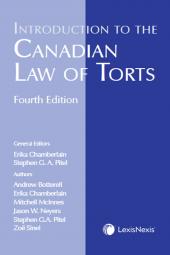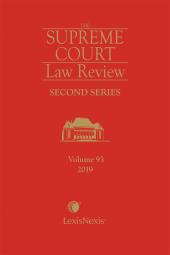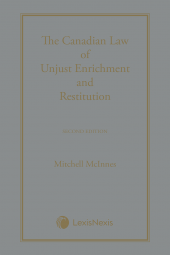Introduction to the Canadian Law of Torts, 4th Edition
This title provides the explanation and analysis needed to confidently navigate not only the key concepts but also many of the details and subtleties of tort law.
Select a format
One Year Subscription Only Terms
Subscribers receive the product(s) listed on the Order Form and any Updates made available during the annual subscription period. Shipping and handling fees are not included in the annual price.
Subscribers are advised of the number of Updates that were made to the particular publication the prior year. The number of Updates may vary due to developments in the law and other publishing issues, but subscribers may use this as a rough estimate of future shipments. Subscribers may call Customer Support at 800-833-9844 for additional information.
Subscribers may cancel this subscription by: calling Customer Support at 800-833-9844; emailing customer.support@lexisnexis.com; or returning the invoice marked 'CANCEL'.
If subscribers cancel within 30 days after the product is ordered or received and return the product at their expense, then they will receive a full credit of the price for the annual subscription.
If subscribers cancel between 31 and 60 days after the invoice date and return the product at their expense, then they will receive a 5/6th credit of the price for the annual subscription. No credit will be given for cancellations more than 60 days after the invoice date. To receive any credit, subscriber must return all product(s) shipped during the year at their expense within the applicable cancellation period listed above.
Product description
Tort law includes the legal rules that govern many important subjects such as negligence, nuisance, defamation and trespass. These rules are of foundational importance for lawyers and judges and are also important for members of the public seeking to understand their rights and responsibilities in their everyday and commercial activities. Because tort law is primarily drawn from the results of many judicial decisions in individual cases, it can be difficult to understand.
Introduction to the Canadian Law of Torts, 4th Edition provides the explanation and analysis needed to confidently navigate not only the key concepts but also many of the details and subtleties. Written by a team of leading tort law scholars, the fourth edition builds on the earlier editions written by the late Gerald Fridman, one of the finest legal scholars of his generation. It is a must-have addition to the libraries of practitioners and law students alike. It is an essential resource for those learning tort law and an excellent primer and quick reference for those with greater familiarity.
Features of This Book
Introduction to the Canadian Law of Torts, 4th Edition explores all of the main areas of the law of torts. The first six chapters examine the important core concepts: the nature of torts, the possible parties to a tort action, vicarious liability, issues raised by multiple wrongdoers, possible remedies and the termination of liability.
The book moves on to discuss many specific causes of action including trespass, nuisance, strict liability, negligence, defamation, invasion of privacy, malicious prosecution, misfeasance in public office, deceit, passing off, conspiracy, intimidation, inducing breach of contract and the unlawful means tort.
Introduction to the Canadian Law of Torts, 4th Edition been thoroughly updated to reflect changes and developments in the law since the publication of the third edition in 2012. It covers all of the important judicial decisions and statutes relating to tort law.
Who Should Read This Book
- Lawyers who handle tort law matters in their practice
- Law firms that want to keep their libraries current
- Law societies and court libraries committed to maintaining their resources
- Law students looking for a clear and comprehensive guide to the law of torts
Table of contents
Chapter 1: The Nature of Torts
Chapter 2: Parties to an Action
Chapter 3: Vicarious Liability
Chapter 4: Multiple Wrongdoers
Chapter 5: Remedies
Chapter 6: Termination of Liability
Chapter 7: Trespass to Land
Chapter 8: Nuisance
Chapter 9: Rylands v Fletcher Liability
Chapter 10: The Scienter Doctrine
Chapter 11: Trespass to Goods
Chapter 12: Conversion
Chapter 13: Detinue
Chapter 14: Trespass to the Person
Chapter 15: Negligence: General Principles
Chapter 16: Negligence: Particular Liabilities
Chapter 17: Defamation
Chapter 18: Invasion of Privacy
Chapter 19: Actions for the Abuse of Legal Procedure
Chapter 20: Misfeasance in Public Office
Chapter 21: Deceit
Chapter 22: Injurious Falsehood
Chapter 23: Passing Off
Chapter 24: Conspiracy
Chapter 25: Intimidation
Chapter 26: Inducing Breach of Contract
Chapter 27: Causing Loss by Unlawful Means
 Lexis Nexis
Lexis Nexis 



